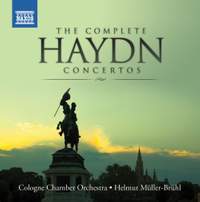Haydn's keyboard and horn concertos
Even the great Dennis Brain didn't consider it worth recording (commercially - although there is a gritty, hissy old BBC tape of it with DB and the BBC Midland Light orchestra that briefly had an outing on 'BBC legends').

 Perhaps the fact that I didn't spot this bears out your comment on unmemorability!
Perhaps the fact that I didn't spot this bears out your comment on unmemorability! . It's not a competion, after all...
. It's not a competion, after all...
Comment